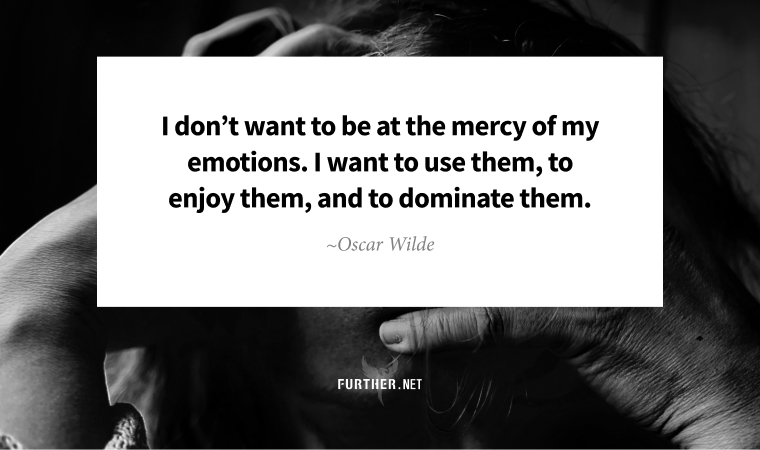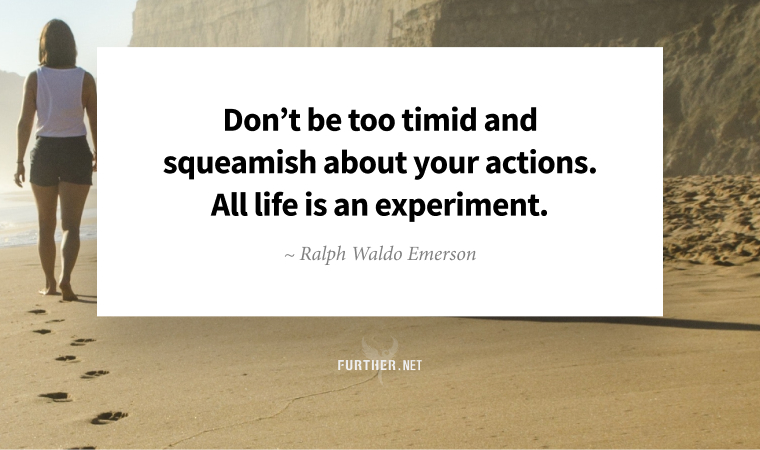
It’s almost that time of year — the one U.S. holiday that openly speaks of emotions: Thanksgiving. However, as Brian once wrote, the trouble with Thanksgiving is that the primary feeling related to the holiday, gratitude, often gets lost in the turkey/stuffing/football sauce.
This can be seen as a metaphor for how easy it is to take emotions for granted vs. using them as an opportunity for growth. Unless you’ve been under a rock for the last decade when Brené Brown’s viral TEDx talk, “The Power of Vulnerability,” dropped (today it has 16.5+ million views), you know that understanding your emotional landscape is key to a more fulfilling, authentic experience of life.
To get started on this essential journey, Brown says the first step is learning to name your emotions beyond the three basic feelings most people can identify (“happy, sad, pissed off”). While I’m intrigued to read her take on the 87 emotions that shape our human experience in her upcoming, already bestselling book, Atlas of the Heart, her reference to a Buddhist concept in a recent New Yorker article — ”far and near enemies” — gives a compelling clue about gaining mastery over your emotions.
If you share something with me and I’m cruel, it’s very clear that I’ve been terrible, right? But what we really have to watch out for are the near enemies — the emotions and qualities that masquerade as the virtue we’re seeking but actually undermine it.
Let’s look at gratitude’s near and far enemies as an example. The far enemies are straight-up opposites: ingratitude, thanklessness, entitlement, resentment. But the near one is what we tend to exhibit when asked to share what we’re grateful for at the Thanksgiving table: exuberance.
Being overly (or even falsely) enthusiastic about something isn’t a replacement for genuine thankfulness, nor is it an effective happiness practice. It’s just a fallback position, a way to appear grateful — especially when you’re put on the spot and feel the social pressure to share.
Heartfelt gratitude, on the other hand, is a potent emotion for creating positive change. When you focus on what’s good in your life, you minimize your brain’s natural propensity to sense threats and negativity. This helps you experience more happiness — and that goes not just for you but also those connected to your feeling of gratitude.
And that’s the ticket to a more fulfilling experience of life: connection. In Brown’s continuing quest to understand interpersonal relationships, she applies the Buddhist perspective to unearth a vital universal truth:
While the far enemy of connection is disconnection, the near enemy of connection is control.
There’s Brown’s signature vulnerability piece — letting go of control isn’t easy for most of us. The example she gives is a kid who tells a parent they got in trouble at school, and instead of asking about the circumstance, the parent instead instructs and scolds. It’s easy to see which way is healthier and happier for both sides.
At a time when disconnection from each other and ourselves reigns, now’s the time to work on cultivating emotional intelligence. Guided by curiosity and compassion, you’ll discover a cornucopia of connection and an abundance of things to be grateful for.
Brené Brown’s Empire of Emotion
If one of the things that gives you all the feels is being free to work from wherever you want, then keep reading — Anywhereist Susanna Perkins has the #1 thing all digital nomads need. And in the Flashback, we do an unheard of doubling up on last week’s band based on Brian’s current location.
Finally, speaking of things we’re thankful for, Brian and I appreciate your reading and subscribing to Further. We’re off next week, and then Brian’s back here in the top spot, undoubtedly with new perspectives and wisdom to share from his time abroad.
Happy Thanksgiving!
P.S. New to Further? Join us here.
Is HIIT Really It?
The short answer is yes, but it’s worth reading the whole article for the joy of discovering what a “fartlek” is and why the Swedish approach is more fun than your average interval training. Here’s to letting better health and longevity rip.
Does High-Intensity Exercise Affect Our Hearts? Minds? Life Spans? Waistlines?
Salad Daze
For the planet’s and your well-being, take grab ’n go greens out of your diet: “The reason we’re fat is not that we don’t eat enough salad. We’re fat because we’ve lost our connection to food. We’ve forgotten what it means to eat healthy.”
Bag Salad is Evil. Learn Why, and You’ll Never Buy It Again
This Longevity Tip is Nuts
Finally, justification for my trail mix obsession: “A high intake of alpha linolenic acid (ALA) – found mainly in nuts, seeds and plant oils — is associated with a lower risk of death from all causes, and specifically from diseases of the heart and blood vessels, finds a new study.”
High intake of omega-3 in nuts, seeds, plant oils linked to longevity
Morning Has Broken
Nobody has full control over their lives; however, that’s no excuse for letting your morning run amok. “Sometimes we can’t stick to a morning routine because we need to work harder on setting ourselves up for success.”
The Reason You Can’t Stick to Your Morning Routine
If You Want to Work From Anywhere, Do This First

By Susanna Perkins
Do you envision yourself living in new and interesting locations, supporting yourself with work you can do from anywhere in the world?
If so, your first step has nothing to do with travel plans or even tech, software, or tools, but it’s vital to make that dream a reality.
I’m talking about your mindset.
The best way to choose your path in life — particularly if it’s unconventional, like, say, becoming a digital nomad at age 59 — is a growth mindset, popularized by Stanford researcher Carol Dweck in her book, Mindset: The New Psychology for Success.
With an outlook that thrives on challenges and change, you’ll be ready to explore far-flung places you would’ve only dreamed of if you didn’t have an open mind for the open road.
What’s Your Mindset?
In a nutshell, if your mindset is fixed, you believe you’re stuck with the natural traits and abilities you were born with. If you have a growth mindset, you believe you can learn new skills and improve with practice and application.
This leads to differing views of success and failure and impacts your willingness to move outside your comfort zone.
Creativity, exploration, and innovation — traits you need to build a successful business, for example — require a growth mindset. These attributes are also core to digital nomadism, along with a willingness to experiment, fail, and adjust.
Retrain Your Brain
If you’ve had a fixed mindset until now, there’s good news.
You can retrain your brain to develop a growth mindset. Psychology Today recommends 15 steps, starting with acknowledging and embracing imperfection in yourself.
Better yet, take action! Small, repeated actions change beliefs, according to James Clear, author of Atomic Habits.
For example, my husband took up cycling in his late 50s, starting with a few short rides. Over time, he started thinking of himself as a cyclist instead of a couch potato, so he rode nearly every day. That’s what cyclists do, after all.
At 64, he successfully competed against riders in their 20s and 30s in Panama’s Ocean to Ocean race of about 54 miles.
He created what Clear calls “identity-based habits.” As Clear explains:
“You can become more creative, more intelligent, more athletic, more artistic, and more successful by focusing on the process, not the outcome… It’s not about the result, it’s about building the identity of the type of person who gets to enjoy those results.”
I swapped being a book lover with overflowing bookshelves to a mobile reader with a well-stocked Kindle. That might seem like a small change, but for me, it’s huge, with outsize rewards.
If you want to be the type of person who gets to travel the world doing work you love, your journey begins with your mindset.
How Your Beliefs Can Sabotage Your Behavior (James Clear)
further: flashback

Van Halen – Panama
1984, 1984
What? Van Halen two weeks in a row, from the same album? Well, even though the song is about a car, Brian is in Panama right now, so …. (YouTube)
further: sharing

Further subscribers earn $MOVE coin to get cool gear and special access to member-only resources simply by referring friends to join the newsletter. Get your own free weekly dose of health, wealth, travel, and happiness advice here.
Thank you for sharing Further!
